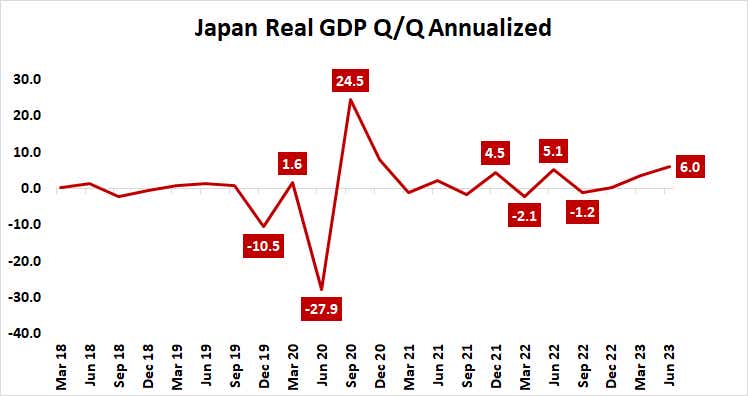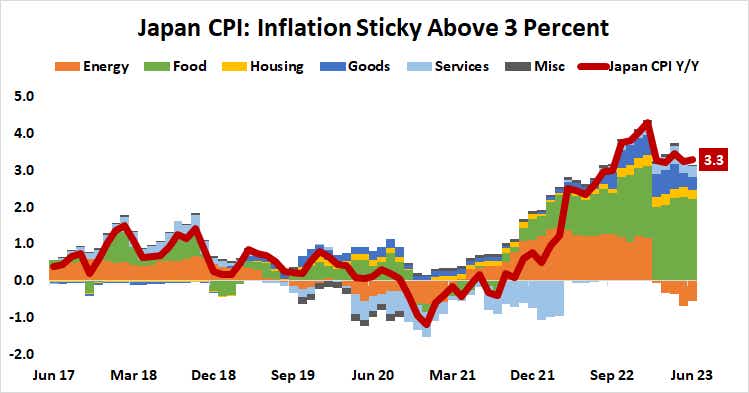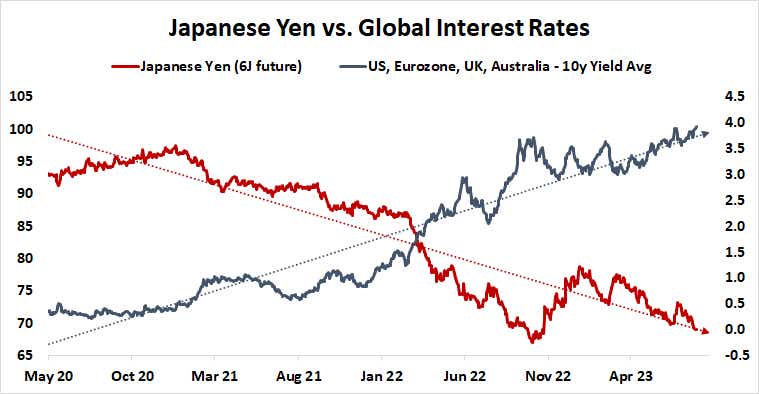Japan's GDP Surge is a Mirage (But the Yen May Still Rise)

Japan's GDP Surge is a Mirage (But the Yen May Still Rise)
By:Ilya Spivak
Japan’s sharp second-quarter GDP rise is unlikely to spur BOJ action, but the yen may continue to advance
- Japan’s GDP growth surged in the second quarter, doubling expectations.
- Bank of Japan still looks unlikely to rush toward an exit from ultra-loose policy.
- The yen may rise as growing concern about a global recession weigh on bond yields.
At first glance, Japan’s economy appears to have surged ahead in the second quarter. Data published this week showed gross domestic product (GDP) grew at an annualized rate of 6%, crushing expectations anticipating a rise of 2.9%. The first quarter’s results were also upgraded to 3.7%, up from the previously published 2.7%.
Such robust performance seems to endorse speculation that the Bank of Japan (BOJ) might be angling for an exit from decades of ultra-loose monetary policy. This is a tempting narrative. The GDP deflator–a measure of inflation used to discount the impact of price changes on growth figures to arrive at “real” results–rose from 2.0% to 3.4% in the three months to June. The benchmark consumer price index (CPI) gauge puts inflation at 3.3%, well above the central bank’s target.

Japan GDP growth: less than meets the eye
Not all is as it seems, however.
In quarterly terms, GDP rose 1.5%. External demand contributed 1.8% to the equation, while the domestic economy shaved off 0.4%. Most worrying of all, household consumption fell 0.3%. A drop of 0.2% in inventories was partially offset by a small rise in residential investment, making up the balance.
It gets worse.
On the external side, the largest contribution came from imports at 1.1%, while exports added 0.7%. That’s because inbound shipments fell 16.2% from the prior quarter, doubling down on the damning picture of domestic demand painted in the consumption figures. On the bright side, exports rose 13.6% to mark the largest rise in two years.
This hardly signals that the BOJ ought to be rushing to tighten monetary policy. Inflation seems to be mostly imported from abroad, with food prices making the biggest contribution. Japan is an island nation. Much of what it consumes comes from abroad, so it is understandably sensitive to rising prices beyond its borders.

A weak Japanese yen (JPY) compounds the situation. It has been sinking since early 2021 as the BOJ stood aside while other major central banks rushed to raise interest rates. That has eroded Japanese consumers’ purchasing power, making foreign goods more expensive in JPY terms.
Japanese yen may rise as global recession worries build
The currency may be gearing up for recovery, but not for the reasons hawkish BOJ-watchers might imagine. That surge in exports in the second-quarter GDP results might wane as the global economy slows, undercutting foreign demand. Indeed, U.S. consumers seem to be the last line of defense against outright global recession, and they have a Fed target painted on their back. The Eurozone is all but certainly in recession and China is struggling to reboot growth after scrapping “zero-COVID” restrictions in December.
After decades without pricing power and rock-bottom interest rates, the yen has developed a firm inverse relationship with global interest rates. That is because investors at home and abroad borrow cheaply in JPY terms, then reinvest in higher-yielding assets—a strategy known as the “carry trade." If a hawkish Fed punctures U.S. consumption–triggering a widespread downturn and spurring bets on a dovish reversal in global monetary policy–the yen is likely to rise.

Ilya Spivak, tastylive head of global macro, has 15 years of experience in trading strategy, and he specializes in identifying thematic moves in currencies, commodities, interest rates and equities. He hosts Macro Money and co-hosts Overtime, Monday-Thursday. @Ilyaspivak
For live daily programming, market news and commentary, visit tastylive or the YouTube channels tastylive (for options traders), and tastyliveTrending for stocks, futures, forex & macro.
Trade with a better broker, open a tastytrade account today. tastylive, Inc. and tastytrade, Inc. are separate but affiliated companies.
Options involve risk and are not suitable for all investors. Please read Characteristics and Risks of Standardized Options before deciding to invest in options.
tastylive content is created, produced, and provided solely by tastylive, Inc. (“tastylive”) and is for informational and educational purposes only. It is not, nor is it intended to be, trading or investment advice or a recommendation that any security, futures contract, digital asset, other product, transaction, or investment strategy is suitable for any person. Trading securities, futures products, and digital assets involve risk and may result in a loss greater than the original amount invested. tastylive, through its content, financial programming or otherwise, does not provide investment or financial advice or make investment recommendations. Investment information provided may not be appropriate for all investors and is provided without respect to individual investor financial sophistication, financial situation, investing time horizon or risk tolerance. tastylive is not in the business of transacting securities trades, nor does it direct client commodity accounts or give commodity trading advice tailored to any particular client’s situation or investment objectives. Supporting documentation for any claims (including claims made on behalf of options programs), comparisons, statistics, or other technical data, if applicable, will be supplied upon request. tastylive is not a licensed financial adviser, registered investment adviser, or a registered broker-dealer. Options, futures, and futures options are not suitable for all investors. Prior to trading securities, options, futures, or futures options, please read the applicable risk disclosures, including, but not limited to, the Characteristics and Risks of Standardized Options Disclosure and the Futures and Exchange-Traded Options Risk Disclosure found on tastytrade.com/disclosures.
tastytrade, Inc. ("tastytrade”) is a registered broker-dealer and member of FINRA, NFA, and SIPC. tastytrade was previously known as tastyworks, Inc. (“tastyworks”). tastytrade offers self-directed brokerage accounts to its customers. tastytrade does not give financial or trading advice, nor does it make investment recommendations. You alone are responsible for making your investment and trading decisions and for evaluating the merits and risks associated with the use of tastytrade’s systems, services or products. tastytrade is a wholly-owned subsidiary of tastylive, Inc.
tastytrade has entered into a Marketing Agreement with tastylive (“Marketing Agent”) whereby tastytrade pays compensation to Marketing Agent to recommend tastytrade’s brokerage services. The existence of this Marketing Agreement should not be deemed as an endorsement or recommendation of Marketing Agent by tastytrade. tastytrade and Marketing Agent are separate entities with their own products and services. tastylive is the parent company of tastytrade.
tastyfx, LLC (“tastyfx”) is a Commodity Futures Trading Commission (“CFTC”) registered Retail Foreign Exchange Dealer (RFED) and Introducing Broker (IB) and Forex Dealer Member (FDM) of the National Futures Association (“NFA”) (NFA ID 0509630). Leveraged trading in foreign currency or off-exchange products on margin carries significant risk and may not be suitable for all investors. We advise you to carefully consider whether trading is appropriate for you based on your personal circumstances as you may lose more than you invest.
tastycrypto is provided solely by tasty Software Solutions, LLC. tasty Software Solutions, LLC is a separate but affiliate company of tastylive, Inc. Neither tastylive nor any of its affiliates are responsible for the products or services provided by tasty Software Solutions, LLC. Cryptocurrency trading is not suitable for all investors due to the number of risks involved. The value of any cryptocurrency, including digital assets pegged to fiat currency, commodities, or any other asset, may go to zero.
© copyright 2013 - 2026 tastylive, Inc. All Rights Reserved. Applicable portions of the Terms of Use on tastylive.com apply. Reproduction, adaptation, distribution, public display, exhibition for profit, or storage in any electronic storage media in whole or in part is prohibited under penalty of law, provided that you may download tastylive’s podcasts as necessary to view for personal use. tastylive was previously known as tastytrade, Inc. tastylive is a trademark/servicemark owned by tastylive, Inc.
Your privacy choices